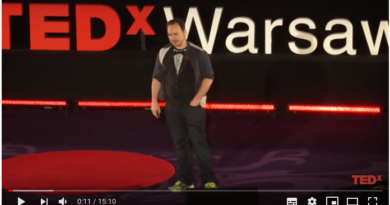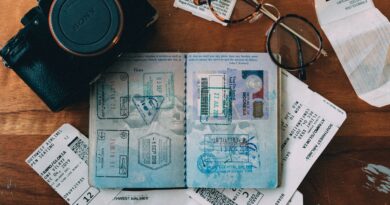Crédito da Imagem: Gabriel Tovar on Unsplash
Neste vídeo, com duração de 4m47s, Luca Lampariello nos oferece 5 passos para para alcançar a proficiência na língua inglesa.
Luca Lampariello fala 13 idiomas (italiano, inglês, francês, espanhol, alemão, holandês, sueco, russo, português, mandarim, japonês e polonês) e no momento estuda húngaro e está trabalhando no aperfeiçoamento do seu conhecimento do polonês.
Saiba mais:
- The Definition of Language Fluency and How to Achieve It (5 Myths Dispelled)
- Portal do autor
- Canal no Youtube
| Audio | |
|---|---|
Normal | Slow |
| English Transcript | Tradução |
| Hi guys! | Oi, pessoal! |
| Last time I talked about the difference between fluency and proficiency. | Da última vez falei sobre a diferença entre fluência e proficiência. |
| And today we're going to talk about how to bridge that gap. | E hoje vamos falar sobre como preencher essa lacuna. |
| So, I'm going to give you five awesome tips to bridge the gap between the B zone and the C zone. | Então, vou lhe dar cinco dicas incríveis para preencher a lacuna entre a zona B e a zona C. |
| Without further ado, let's get started. | Sem mais delongas, vamos começar. |
| Tip number one: step out of your comfort zone. | Dica número um: saia da sua zona de conforto. |
| Once you find yourself in the fluency zone, normally you tend to stay within that zone, because you can do everything in your target language, but if you want to keep expanding and refining your language skills, you have to get out there and get out of your comfort zone, which basically means do things that you cannot do. | Uma vez que você se encontra na zona de fluência, normalmente tende a ficar dentro dessa zona, porque você pode fazer tudo no seu idioma de destino, mas se você quiser continuar expandindo e refinando suas habilidades no idioma, você tem que ir lá e sair da sua zona de conforto, o que basicamente significa fazer coisas que você não consegue fazer. |
| Now, if we take the four areas of language learning, let me give you a few examples. | Agora, se considerarmos as quatro áreas de aprendizagem de línguas, deixe-me dar alguns exemplos. |
| If you have been speaking about everyday topics, now get out there, get a native speaker and talk about things that are a little bit more complex and that implies also a certain kind of language. | Se você tem conversa sobre assuntos do dia a dia, agora saia por aí, pegue um falante nativo e fale sobre coisas que são um pouco mais complexas e que implicam também em um determinado tipo de linguagem. |
| Write essays about things that, once again, are complex and that you can discuss in a certain way by using certain connectors. | Escreva ensaios sobre coisas que, mais uma vez, são complexas e que você pode discutir de certa forma usando certos conectores. |
| Or read books that you haven't read yet, work about novels for example, or about more complex things, about cosmology, oh you name it. | Ou leia livros que você ainda não leu, romances por exemplo, ou coisas mais complexas, como cosmologia, ah, o que você quiser. |
| The important thing is that you like, obviously, what you read. | O importante é que você goste, obviamente, do que lê. |
| Listen to podcasts or listen or watch documentaries about things that you haven't watched yet and you haven't touched upon yet. | Ouça podcasts ou ouça ou assista documentários sobre coisas que você ainda não assistiu e que ainda não conhece. |
| Tip number two: follow the fun. | Dica número dois: divirta-se. |
| Normally when you are in a certain zone, you've been doing certain things and you had fun doing these things, well, that's awesome, but when you want to move from one zone to the other, you should keep having fun but at the same time, do something different than you did before. | Normalmente, quando você está em uma determinada zona, você faz certas coisas e se diverte fazendo essas coisas, bem, isso é incrível, mas quando você quer passar de uma zona para outra, você deve continuar se divertindo, mas ao mesmo tempo, faça algo diferente do que você fazia antes. |
| In my example, I use the bi-directional translation to get a foundation of the language, but once I have gotten a foundation of the language, well, I move on to something else because that kind of bi-directional translation becomes a little bit boring. | No meu caso, eu uso a tradução bidirecional para obter uma base da linguagem, mas uma vez que tenho uma base da linguagem, bem, eu mudo para outra coisa porque esse tipo de tradução bidirecional se torna um pouco chato. |
| Tip number three: do things progressively. | Dica número três: faça as coisas de maneira progressiva. |
| Language learning, I always say, that language learning is a not a linear but it's a progressive process, so you have to make sure that you do things that are progressively more difficult. | Aprendizado de línguas, eu sempre digo, que o aprendizado de línguas não é um processo linear, mas progressivo, então você tem que ter certeza de fazer coisas que são progressivamente mais difíceis. |
| For example, let's say for example that you want to, let's consider reading. | Por exemplo, digamos que você queira, vamos considerar a leitura. |
| At the beginning, you can read something which is really simple, like language learning material, and then you can move on to bilingual books, and then to monolingual books, and then on to newspapers and things that are a little bit more complicated. | No início, você pode ler algo que é realmente simples, como material de aprendizagem de línguas, e então você pode passar para livros bilíngues, e então para livros monolíngues, e então para jornais e coisas que são um pouco mais complicadas. |
| You can do the same thing for speaking. | Você pode fazer a mesma coisa para falar. |
| At the beginning, you can talk about everyday topics which are really simple, then you can have a specific speech about a specific topic, then you can do storytelling, then you can do, describe images after concepts and so on. | No início, você pode falar sobre tópicos do cotidiano que são realmente simples, então você pode fazer uma palestra específica sobre um tópico específico, então você pode fazer uma narrativa, você pode fazer, descrever imagens e conceitos e assim por diante. |
| But in this way, you're getting out of your comfort zone in a progressive way. | Mas, desta forma, você está saindo da sua zona de conforto de forma progressiva. |
| Tip number four: understand deliberate versus natural practice. | Dica número quatro: entenda a prática deliberada versus a prática natural. |
| This is a very important point. | Este é um ponto muito importante. |
| Normally we tend to associate language learning with books, with dry studying, but that is actually not so. | Normalmente, tendemos a associar o aprendizado de línguas aos livros, ao estudo árido, mas na verdade não é assim. |
| Language learning is about life. | A aprendizagem de línguas é sobre a vida. |
| Language learning is about getting out there, watching movie with friends, go out, have fun. | Aprender um idioma é sair, assistir filmes com os amigos, sair e se divertir. |
| So, I think the deliberate practice, the practice that is, sit down and study and practice, is great, but it's just one part of English learning. | Então, eu acho que a prática deliberada, a prática que é sentar, estudar e praticar, é ótima, mas é apenas uma parte do aprendizado de inglês. |
| You have to integrate it with a more natural practice. | Você tem que integrá-lo a uma prática mais natural. |
| Let me give an example, well, playing video games, reading a book that you like, going out with friends, and talk about stuff. | Deixe-me dar um exemplo, jogar videogame, ler um livro que você goste, sair com os amigos e conversar sobre coisas. |
| These are all things that are within the realm of the natural practice and they are as important as the deliberate practice. | Todas essas coisas estão dentro da esfera da prática natural e são tão importantes quanto a prática deliberada. |
| What you have to do is to balance the two. | O que você precisa fazer é equilibrar os dois. |
| Step number five, which is more like a rule than a step actually is: be patient. | A etapa número cinco, que é mais uma regra do que uma etapa, na verdade é: seja paciente. |
| Language learning is a long road, and in this case, bridging the gap between the B zone and the C zone, that is one of the longest and hardest stretches out there. | O aprendizado de línguas é um longo caminho e, neste caso, preencher a lacuna entre a zona B e a zona C, que é um dos trechos mais longos e difíceis que existem. |
| So actually imagine it like, once again, climbing the mountain instead of looking at the top and cursing the distance in between. | Então, imagine realmente como, mais uma vez, escalar a montanha em vez de olhar para o topo e amaldiçoar a distância entre eles. |
| You should focus on every single step and enjoy the view every time. | Você deve se concentrar em cada passo e apreciar a vista o tempo todo. |
| Because every single step is one step towards the summit, where it will finally appoint the flag and that will happen one day, if you keep doing all these things. | Porque cada passo é um passo em direção ao cume, onde finalmente vai apontar a bandeira e isso vai acontecer um dia, se você continuar fazendo todas essas coisas. |
| And thanks for watching and I'm going to talk to you very soon. | E obrigado por assistir e falarei com você muito em breve. |
| Bye, ciao. | Tchau, ciao. |
Contagem de palavras
A tabela abaixo exibe as palavras encontradas neste vídeo bem como o número de vezes em que aparecem.
Veja também: Para que serve esta tabela?
| Freq. | Palavra | Freq. | Palavra | Freq. | Palavra |
|---|---|---|---|---|---|
| 37 | you | 32 | the | 27 | and |
| 23 | to | 22 | that | 22 | a |
| 15 | is | 14 | about | 13 | language |
| 12 | things | 12 | of | 11 | zone |
| 10 | do | 9 | out | 9 | learning |
| 9 | in | 9 | can | 9 | are |
| 8 | have | 8 | but | 7 | practice |
| 6 | then | 6 | step | 6 | so |
| 6 | one | 6 | more | 6 | I |
| 6 | get | 5 | your | 5 | with |
| 5 | talk | 5 | on | 5 | number |
| 5 | like | 5 | for | 5 | example |
| 5 | certain | 4 | which | 4 | tip |
| 4 | there | 4 | read | 4 | or |
| 4 | once | 4 | it | 4 | if |
| 4 | going | 4 | fun | 4 | books |
| 4 | between | 4 | at | 3 | yet |
| 3 | well | 3 | way | 3 | want |
| 3 | time | 3 | this | 3 | these |
| 3 | something | 3 | normally | 3 | natural |
| 3 | move | 3 | little | 3 | let's |
| 3 | keep | 3 | important | 3 | haven't |
| 3 | give | 3 | gap | 3 | every |
| 3 | doing | 3 | deliberate | 3 | complex |
| 3 | comfort | 3 | bit | 3 | because |
| 3 | actually | 2 | within | 2 | will |
| 2 | when | 2 | what | 2 | we |
| 2 | watching | 2 | very | 2 | two |
| 2 | translation | 2 | topics | 2 | thing |
| 2 | than | 2 | tend | 2 | specific |
| 2 | speaking | 2 | single | 2 | simple |
| 2 | should | 2 | say | 2 | same |
| 2 | really | 2 | reading | 2 | progressively |
| 2 | progressive | 2 | now | 2 | not |
| 2 | me | 2 | listen | 2 | let |
| 2 | kind | 2 | it's | 2 | I'm |
| 2 | getting | 2 | friends | 2 | four |
| 2 | foundation | 2 | fluency | 2 | five |
| 2 | everyday | 2 | directional | 2 | c |
| 2 | bridge | 2 | bi | 2 | beginning |
| 2 | been | 2 | b | 2 | awesome |
| 2 | as | 2 | all | 2 | again |
| 1 | you've | 1 | yourself | 1 | you're |
| 1 | write | 1 | work | 1 | without |
| 1 | where | 1 | we're | 1 | watched |
| 1 | watch | 1 | view | 1 | video |
| 1 | versus | 1 | using | 1 | use |
| 1 | upon | 1 | understand | 1 | towards |
| 1 | touched | 1 | topic | 1 | top |
| 1 | today | 1 | tips | 1 | three |
| 1 | think | 1 | they | 1 | that's |
| 1 | thanks | 1 | target | 1 | talked |
| 1 | take | 1 | sure | 1 | summit |
| 1 | stuff | 1 | studying | 1 | study |
| 1 | stretches | 1 | storytelling | 1 | stay |
| 1 | started | 1 | speech | 1 | speaker |
| 1 | soon | 1 | skills | 1 | sit |
| 1 | rule | 1 | road | 1 | refining |
| 1 | realm | 1 | proficiency | 1 | process |
| 1 | point | 1 | podcasts | 1 | playing |
| 1 | patient | 1 | part | 1 | other |
| 1 | oh | 1 | obviously | 1 | novels |
| 1 | newspapers | 1 | native | 1 | name |
| 1 | my | 1 | movie | 1 | mountain |
| 1 | monolingual | 1 | means | 1 | material |
| 1 | make | 1 | looking | 1 | longest |
| 1 | long | 1 | linear | 1 | life |
| 1 | last | 1 | just | 1 | integrate |
| 1 | instead | 1 | implies | 1 | imagine |
| 1 | images | 1 | how | 1 | hi |
| 1 | having | 1 | hardest | 1 | happen |
| 1 | had | 1 | guys | 1 | great |
| 1 | gotten | 1 | go | 1 | games |
| 1 | further | 1 | from | 1 | follow |
| 1 | focus | 1 | flag | 1 | find |
| 1 | finally | 1 | few | 1 | expanding |
| 1 | examples | 1 | everything | 1 | essays |
| 1 | enjoy | 1 | english | 1 | else |
| 1 | dry | 1 | down | 1 | documentaries |
| 1 | distance | 1 | discuss | 1 | difficult |
| 1 | different | 1 | difference | 1 | did |
| 1 | describe | 1 | day | 1 | cursing |
| 1 | cosmology | 1 | consider | 1 | connectors |
| 1 | concepts | 1 | complicated | 1 | climbing |
| 1 | ciao | 1 | case | 1 | cannot |
| 1 | bye | 1 | by | 1 | bridging |
| 1 | boring | 1 | book | 1 | bilingual |
| 1 | before | 1 | becomes | 1 | be |
| 1 | basically | 1 | balance | 1 | associate |
| 1 | areas | 1 | appoint | 1 | an |
| 1 | always | 1 | also | 1 | after |
| 1 | ado |










